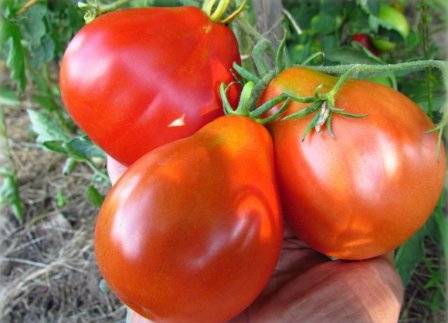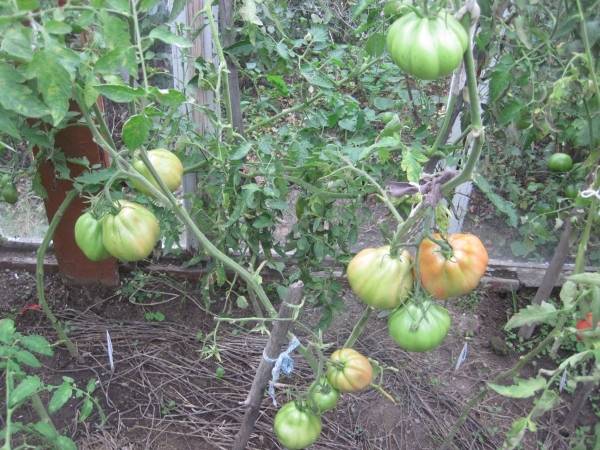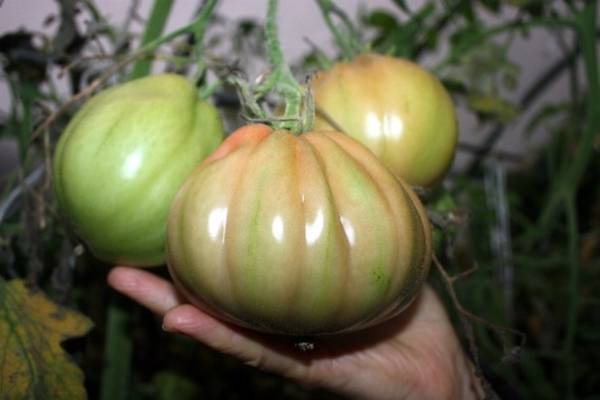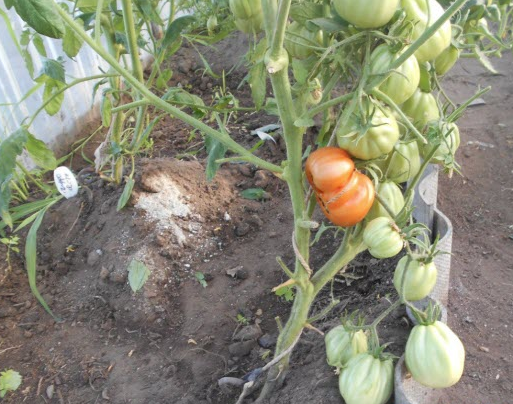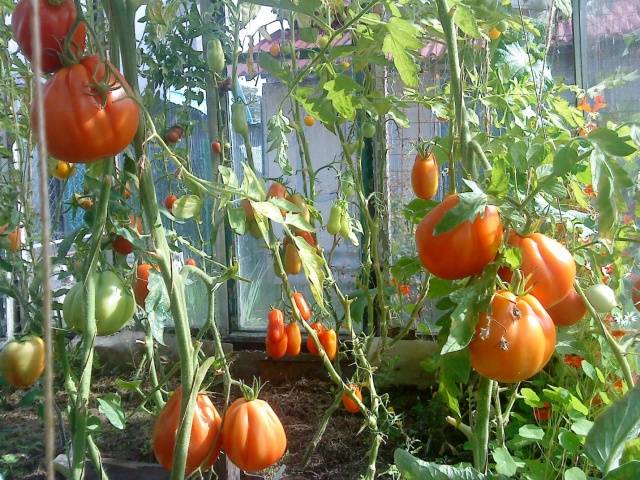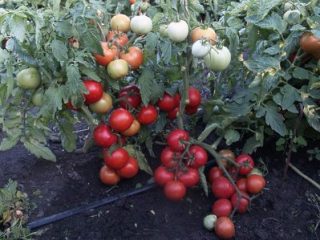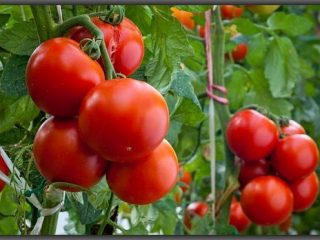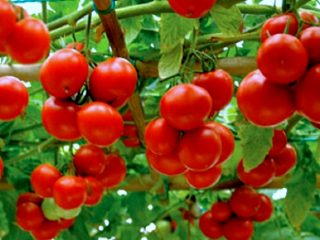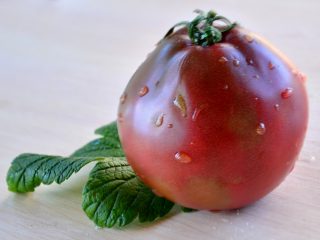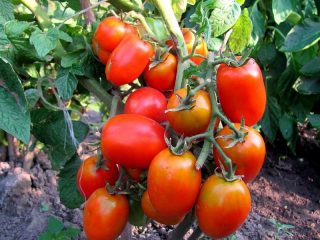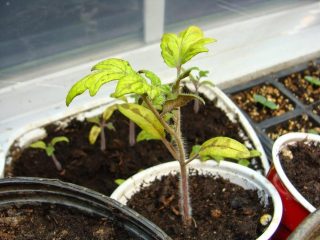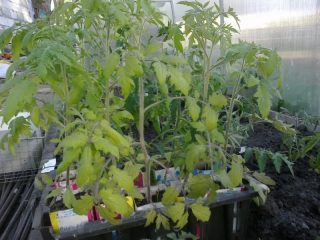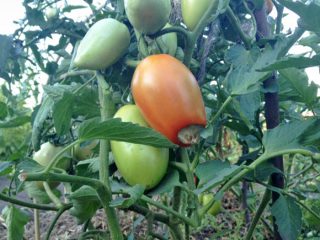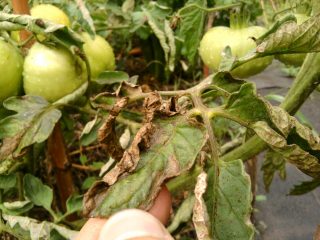Content
The “One Hundred Poods” variety should be included in the category of unusual tomatoes. This original name most clearly demonstrates the peculiarity of these tomatoes: they are very large and weighty. Their shape resembles a huge drop or a small rag bag filled with something very heavy. Photos of such unique tomatoes and the main characteristics of the “One Hundred Poods” variety are offered later in the article. For anyone interested, we will also try to give recommendations that will help you successfully grow amazing tomatoes with your own hands.
Detailed description of the variety
The “One Hundred Poods” tomato variety has recently become available to domestic gardeners. It was included in the State Register only in 2013. But in just a few years, this variety of amazing tomatoes gained popularity and became the favorite variety of many farmers.
Description of the plant
The “100 poods” variety is indeterminate and is characterized by a long fruiting period. Its bushes grow constantly, and only unfavorable weather conditions can cause this process to end. The “One Hundred Poods” variety of tomatoes can be grown in open beds only in the southern regions of the country. In the central and northern regions, it is recommended to grow tomatoes in greenhouses.It is also worth considering that it is in greenhouse conditions that the variety demonstrates its record yield.
Throughout the growing process, “One Hundred Poods” tomatoes must be properly shaped by removing side shoots. During the formation process, you can only leave one stepson, which over time will become the second fruit-bearing branch.
In open ground conditions and in a greenhouse, “One Hundred Poods” tomatoes do not have time to fully yield the entire harvest, so many farmers pinch the top of a powerful, tall bush a month before the end of the summer season. This allows nutrients to be directed not to growing additional leaves, but to ripening existing vegetables.
Indeterminate bushes in greenhouse conditions can grow up to 2-2.5 m. In open areas of soil, their height, as a rule, does not exceed 1.5 m. On high shoots, fruiting clusters with 3-5 ovaries are actively formed. It is recommended to partially thin out the few leaves of tomatoes to optimize the distribution of nutrients and to prevent the development of diseases.
Tall tomato bushes “One Hundred Poods” require careful gartering. Moreover, not only the long stems themselves should be secured to the support, but also the fruiting brushes, which can break under the weight of the tomatoes.
Characteristics of vegetables
Tomatoes of the “100 poods” variety have amazing characteristics. They have a unique shape that is unlike anything else. Some experts claim that the shape of these tomatoes is teardrop-shaped; in many reviews it is characterized as pear-shaped. You can evaluate the real shape of the “One Hundred Poods” tomatoes in the photo below:
Large tomatoes of this variety weigh about 200-300 g.Their characteristic feature is the presence of pronounced longitudinal ribs located over the entire surface of the fruit. Ripe tomatoes have a bright red, very appetizing color. The skin of tomatoes is quite thin and tender. When eating fresh tomatoes, it is barely noticeable. The pulp of tomatoes is dense and meaty. There is practically no free liquid and seeds in the internal cavity of the vegetable.
When you cut into a tomato, you can observe the release of a bright, fresh aroma. It stimulates the appetite of everyone nearby. Having tasted the pulp, no one will be disappointed, because a large amount of sugar and a low percentage of acidity make the tomato very, very tasty. And is it worth noting that with such taste characteristics, the “One Hundred Poods” tomato variety is a salad variety and is recommended for preparing fresh dishes.
The rather dense pulp and low free liquid content make it possible to successfully prepare paste from tomatoes, however, it is unlikely that it will be possible to make juice from such vegetables. The taste of tomatoes after canning retains its uniqueness, but, unfortunately, large tomatoes will have to be cut into several parts to put them in a jar.
Productivity of the variety
The “100 poods” variety has a short period of fruit ripening. So, to obtain a massive harvest of vegetables, about 110 days must pass from the moment the first green shoots appear. The ripening period of tomatoes is also affected by the number of transplants and the speed of plant adaptation to new conditions.
It is recommended to grow tomatoes in seedlings.Seeds are sown in the ground in early April and at the age of 45-55 days the seedlings are planted in a greenhouse or in a garden bed. In just a month you will be able to taste the first ripe tomatoes. In general, the yield of plants of the “One Hundred Poods” variety is quite high and is about 6 kg/bush or 20 kg/m2.
Disease resistance
The tomato variety “One Hundred Poods” is highly resistant to harmful microflora. Genetic protection of the plant allows you to grow a good, abundant and environmentally friendly harvest without the use of chemicals. It is important to remember that if certain cultivation rules are not followed, the invasion of diseases and insects cannot be avoided. We will try to recall only some important nuances of growing “healthy” tomatoes:
- Before planting tomatoes, the soil should be disinfected with a solution of potassium permanganate.
- The greenhouse should provide for normal air circulation.
- Weeding, loosening and mulching the soil, and removing excess foliage is an effective measure in combating the development of diseases.
- As a preventive measure in the fight against fungal diseases, you can use spraying plants with a solution of potassium permanganate.
- Timely inspection of plants will make it possible to combat insects in the early stages by mechanically eliminating them.
- Some traditional methods can effectively combat diseases and pests, while maintaining the quality and environmental friendliness of vegetables.
Thus, you should not rely only on the genetic resistance of tomatoes to various diseases, because only a set of measures will certainly preserve the health of plants and crops.
Advantages and disadvantages of the variety
The characteristics and description of the “100 poods” tomato variety do not allow us to talk about any obvious shortcomings. The need to form and tie up a bush is perhaps the only nuance that can cause certain difficulties in the cultivation process. Otherwise, “One Hundred Poods” tomatoes are characterized only by positive qualities:
- amazing appearance and taste of vegetables;
- high productivity;
- short period of fruit ripening;
- unpretentiousness to growing conditions;
- good disease resistance.
Conclusion
For all their simplicity and unpretentiousness, “One Hundred Poods” tomatoes have an excellent taste and aroma that leaves no one indifferent. These tomatoes are irreplaceable in salads; they make a very thick, interesting sauce, and even after canning they remain unique. Anyone who has tried “One Hundred Poods” tomatoes at least once will certainly want to grow them themselves in their garden, so that at any moment they will be able to feel this excellent taste again.
